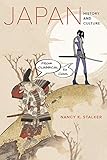Japan : history and culture from classical to cool / Nancy K. Stalker.
Material type: TextPublication details: Oakland, California : University of California Press, (c)2018.Description: 1 online resourceContent type:
TextPublication details: Oakland, California : University of California Press, (c)2018.Description: 1 online resourceContent type: - text
- computer
- online resource
- 9780520962835
- DS806 .J373 2018
- COPYRIGHT NOT covered - Click this link to request copyright permission: https://lib.ciu.edu/copyright-request-form
| Item type | Current library | Collection | Call number | URL | Status | Date due | Barcode | |
|---|---|---|---|---|---|---|---|---|
 Online Book (LOGIN USING YOUR MY CIU LOGIN AND PASSWORD)
Online Book (LOGIN USING YOUR MY CIU LOGIN AND PASSWORD)
|
G. Allen Fleece Library ONLINE | Non-fiction | DS806 (Browse shelf(Opens below)) | Link to resource | Available | on1019844588 |
Includes bibliographies and index.
Early Japan -- Forging a centralized state (550-794) -- The rule of taste : lives of Heian aristocrats (794-1185) -- The rise and rule of the warrior class (12th-15th centuries) -- Disintegration and reunification (1460s-early 1600s) -- Maintaining control : Tokugawa official culture (1603-1850s) -- Edo popular culture : the floating world (17th-19th centuries) -- Facing and embracing the West (1850s-1900s) -- Modernity and its discontents (1900s-1930s) -- Cultures of empire and war (1900s-1940s) -- Defeat and reconstruction (1945-1970s) -- "Cool" Japan as cultural superpower (1980s-2010s).
"Aesthetics and tradition occupy a central role in modern Japanese national identity to a degree seemingly unparalleled among the world's wealthiest nations. This text surveys highlights in Japanese history, culture, and society from prehistoric to contemporary times, devoting significant attention to the visual and literary arts and to everyday material culture in each period. It provides relatively equal coverage of the premodern and modern eras, describing important historical events, personages, and cultural developments. In addition, it traces gender ideals and the emergence of religious, intellectual, and social protest movements across time. Japan's twentieth century interlude as an empire and colonizer receives a full chapter of coverage, as do postwar economic growth and the nation's emergence as a cultural superpower in the twenty-first century. Countering general perceptions of Japan as a unique and isolated country, the text highlights how interactions with other civilizations, primarily Korea and China in premodern times and Western nations in modernity, have deeply influenced its politics, economy, society and resulted in cultural hybridity"--Provided by publisher.
COPYRIGHT NOT covered - Click this link to request copyright permission:
There are no comments on this title.
